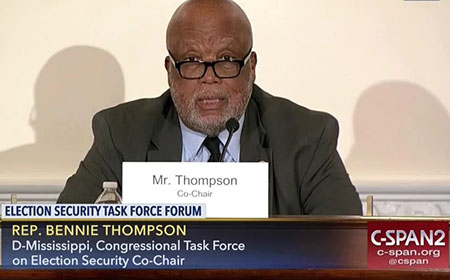by WorldTribune Staff, August 11, 2021
Conspiracy theories anyone? Is it conceivable that a responsible elected official serving in our nation’s capital would warn that Chinese communists might steal the U.S. presidential election?
A task force established by Nancy Pelosi issued a report in 2018 which supported post-election audits and warned that voting machines could be susceptible to “altered vote totals” and influence efforts carried out by the Chinese Communist Party, the National Pulse said.
The Congressional Task Force on Election Security, comprised of six Democrats selected by Pelosi, reported in January 2018 that “our election infrastructure is vulnerable,” appearing to lend credence to claims that the results of the 2020 election could have been manipulated by a foreign actor, Natalie Winters reported on Aug. 9.
 Upon the release of the task force’s report, Winters noted, “no mainstream media outlets criticized House Democrats for subverting U.S. democracy with ‘conspiracy theories,’ as they have done with individuals making the same claims in the context of the 2020 election.”
Upon the release of the task force’s report, Winters noted, “no mainstream media outlets criticized House Democrats for subverting U.S. democracy with ‘conspiracy theories,’ as they have done with individuals making the same claims in the context of the 2020 election.”
Offering a solution to alleged election fraud, after Democrats questioned the security of the 2016 election, the Democrat task force said “states should conduct risk-limiting post-election audits.”
“Election security experts agree that all states should be routinely conducting these audits to detect any anomalies in election results and to increase the public’s confidence in elections,” the task force summarizes before reiterating that audits “increase public confidence in the election system.”
The task force’s report added: “These audits are useful in detecting any incorrect election outcomes, whether they are caused by a cyberattack or something more mundane like a programming error.”
In 2021, officials including Pamela Karlan from Team Biden’s Department of Justice have threatened leaders of the Arizona election audit with criminal prosecution.
The task force also pointed to problems with voting machines, “unequivocally” insisting that “many jurisdictions are using voting machines that are highly vulnerable to an outside attack.”
The Democrats’ report said that voting systems – including those that aren’t connected to the internet – could be susceptible to “alter[ed] vote totals”:
Some will defend the security of election systems by arguing that voting systems are secure because they are not connected to the internet. However, many voting machines contain software or hardware that could be used to connect to the internet. In addition, many machines use removable memory cards or USB sticks to program their machines with ballot data, and it is possible to infect a memory card with malware that could crash a machine or alter vote totals.
The report also presents scenarios whereby hackers could manipulate “unattended” machines in person or their memory cards:
A hacker could exploit the memory card vulnerability in a few different ways. First, an attacker could physically access the machines. While this may seem unlikely, voting machines are sometimes left unattended in polling stations in the days leading up to an election. A greater threat, however, comes from outside vendors. The Brennan Center reports that a relatively small number of outside vendors can be responsible for programming the memory cards for multiple counties in a state. For example, according to Professor J. Alex Halderman, Director of the University of Michigan’s Center for Computer Security and Society, “In Michigan, 75% of counties use just two 20-person companies to do that programming.
The Democrats singled out China as one of the “four greatest state-actor threats,” noting that “the most concerning issue is China’s advanced cyber warfare capabilities could be rapidly deployed and used against the U.S. and our interests should their political motivations and calculations change.”
A report from the National Counterintelligence and Security Center (NCSC) concluded that the Chinese Communist Party “prefers President Trump doesn’t win re-election.”
“China has engaged in various cyber operations either for espionage or political motivations. Furthermore, China, together with Russia, tops the list of state actors that possess the most sophisticated capabilities and have also integrated their cyber tactics into their warfighting strategies and doctrines,” the task force adds.
The six Democrats on the task force were Reps. Bennie Thompson of Mississippi, Robert Brady of Pennsylvania, Zoe Lofgren of California, James Langevin of Rhode Island, Cedric Richmond of Louisiana, and Val Demings of Florida.
INFORMATION WORLD WAR: How We Win . . . . Executive Intelligence Brief
